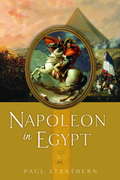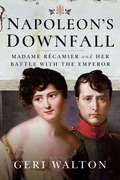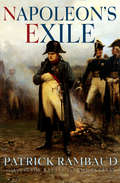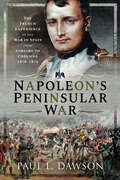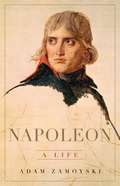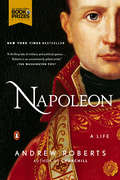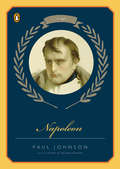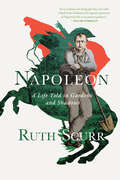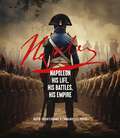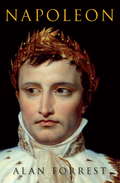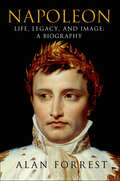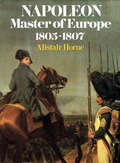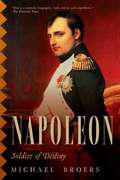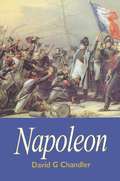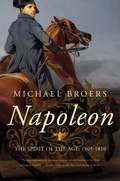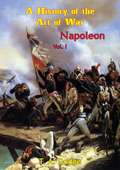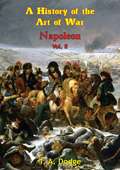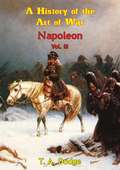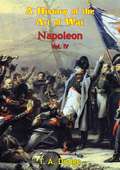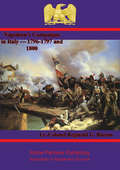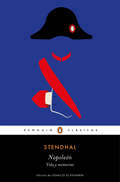- Table View
- List View
Napoleon in Egypt: The Greatest Glory
by Paul StrathernIn 1798, Napoleon Bonaparte, only twenty-eight, set sail for Egypt with 335 ships, 40,000 soldiers, and a collection of scholars, artists, and scientists to establish an eastern empire. He saw himself as a liberator, freeing the Egyptians from oppression. But Napoleon wasn't the first--nor the last--who tragically misunderstood Muslim culture. Marching across seemingly endless deserts in the shadow of the pyramids, pushed to the limits of human endurance, his men would be plagued by mirages, suicides, and the constant threat of ambush. A crusade begun in honor would degenerate into chaos. And yet his grand failure also yielded a treasure trove of knowledge that paved the way for modern Egyptology--and it tempered the complex leader who believed himself destined to conquer the world.
Napoleon in Love
by R. F. DelderfieldA biographical account of the infamous Napoleon I, the French Emperor -- and his relationships with the women in his life.
Napoleon's Downfall: Madame Récamier and Her Battle with the Emperor
by Geri WaltonAn account of the wealthy socialite who opposed the French emperor and found herself exiled from Paris—from the author of Marie Antoinette’s Confidante.Napoleon Bonaparte and Juliette Récamier were both highly influential and well-known in France, yet they were often at odds with each other. Their story played out on the European stage during a period of political upheaval and new political ideas. Napoleon gained power in the aftermath of the French Revolution, and he would go from spectacular victories to dismal failure. His defeat in the early nineteenth century would result in Europe acquiring new national borders and with that Britain, Russia, and the United States would gain greater international influence.Juliette, on the other hand, wielded her own power. Because of the tumultuous French Revolution, noble and aristocratic landowners were being replaced by a new wealthy class in the private sector. Juliette and her husband were among the beneficiaries of this growing affluence and influence, and her power came from her newfound position in society.Juliette also viewed life differently than Napoleon. She saw life from the standpoint of a wealthy socialite whereas Napoleon’s desires were always shaded by his military experiences and his meteoric rise to power.Along the way, Juliette would have to face the testy Emperor, and she would find that his own brother would fall for her. Even some of Napoleon’s greatest enemies would woo her. “A fascinating look at two of the French Revolution’s most amazing and engaging characters, Napoleon Bonaparte and Juliette Récamier, both of whom wielded enormous power in a most turbulent time.” —Books Monthly
Napoleon's Downfall: Madame Récamier and Her Battle with the Emperor
by Geri WaltonAn account of the wealthy socialite who opposed the French emperor and found herself exiled from Paris—from the author of Marie Antoinette’s Confidante.Napoleon Bonaparte and Juliette Récamier were both highly influential and well-known in France, yet they were often at odds with each other. Their story played out on the European stage during a period of political upheaval and new political ideas. Napoleon gained power in the aftermath of the French Revolution, and he would go from spectacular victories to dismal failure. His defeat in the early nineteenth century would result in Europe acquiring new national borders and with that Britain, Russia, and the United States would gain greater international influence.Juliette, on the other hand, wielded her own power. Because of the tumultuous French Revolution, noble and aristocratic landowners were being replaced by a new wealthy class in the private sector. Juliette and her husband were among the beneficiaries of this growing affluence and influence, and her power came from her newfound position in society.Juliette also viewed life differently than Napoleon. She saw life from the standpoint of a wealthy socialite whereas Napoleon’s desires were always shaded by his military experiences and his meteoric rise to power.Along the way, Juliette would have to face the testy Emperor, and she would find that his own brother would fall for her. Even some of Napoleon’s greatest enemies would woo her. “A fascinating look at two of the French Revolution’s most amazing and engaging characters, Napoleon Bonaparte and Juliette Récamier, both of whom wielded enormous power in a most turbulent time.” —Books Monthly
Napoleon's Exile
by Patrick RambaudA &“colorful&” novel about the fall of one of history&’s most notorious figures—and the defeat that would come to define him (Publishers Weekly). It is 1814, and Napoleon Bonaparte retreats to Paris following the debacle of his Russian invasion. Once there, the leader is met with more resistance—a plot to restore a royal to the throne of France succeeds and a humiliated Napoleon is forced to abdicate and go into exile. Octave Senecal, Napoleon&’s loyal aide and savior, tells the tale of their journey south through the angry, mob-filled countryside to Elba, a tiny island off the coast of Tuscany. Horribly bored by this turn of events, Napoleon passes the time gambling with his mother, spearing the occasional tuna with local fishermen, and fretting constantly that secret agents and murderers surround him. He also secretly plans his escape and return to glory. With captivating historical detail and &“the allure of an epic,&” this novel by the award-winning author of The Battle brings to life the complex man behind the renowned general, and offers a fitting send-off to a legend (Anita Brookner).
Napoleon's Peninsular War: The French Experience of the War in Spain from Vimeiro to Corunna, 1808–1809
by Paul L DawsonA renowned historian captures the French experience of the Peninsular War through soldiers’ unpublished memoirs and eyewitness accounts.While much has been written about the British campaigns of the Peninsular War, surprisingly little has been published in English on their opponents, the French. Now, using previously unseen material from the French army archives in Paris, Paul Dawson tells the story of the early years of the Peninsular War as never before.Eyewitness accounts of the Siege of Zaragoza and the Spanish defeats at Medellin and Ocaña are interspersed with details of campaign life and of struggling through the Galician mountains in pursuit of the British army. Dawson captures the perspectives of ordinary French soldiers and their beliefs about the war they were fighting for their Emperor. Napoleon’s Peninsular War is a vital and unprecedented addition to our understanding of the war in Iberia.
Napoleon: A Life
by Adam ZamoyskiThe definitive biography of Napoleon, revealing the true man behind the legend"What a novel my life has been!" Napoleon once said of himself. Born into a poor family, the callow young man was, by twenty-six, an army general. Seduced by an older woman, his marriage transformed him into a galvanizing military commander. The Pope crowned him as Emperor of the French when he was only thirty-five. Within a few years, he became the effective master of Europe, his power unparalleled in modern history. His downfall was no less dramatic.The story of Napoleon has been written many times. In some versions, he is a military genius, in others a war-obsessed tyrant. Here, historian Adam Zamoyski cuts through the mythology and explains Napoleon against the background of the European Enlightenment, and what he was himself seeking to achieve. This most famous of men is also the most hidden of men, and Zamoyski dives deeper than any previous biographer to find him. Beautifully written, Napoleon brilliantly sets the man in his European context.
Napoleon: A Life
by Andrew RobertsThe definitive biography of the great soldier-statesman by the New York Times bestselling author of The Storm of War--winner of the Los Angeles Times Book Prize for Biography and the Grand Prix of the Fondation Napoleon Austerlitz, Borodino, Waterloo: his battles are among the greatest in history, but Napoleon Bonaparte was far more than a military genius and astute leader of men. Like George Washington and his own hero Julius Caesar, he was one of the greatest soldier-statesmen of all times. Andrew Roberts's Napoleon is the first one-volume biography to take advantage of the recent publication of Napoleon's thirty-three thousand letters, which radically transform our understanding of his character and motivation. At last we see him as he was: protean multitasker, decisive, surprisingly willing to forgive his enemies and his errant wife Josephine. Like Churchill, he understood the strategic importance of telling his own story, and his memoirs, dictated from exile on St. Helena, became the single bestselling book of the nineteenth century. An award-winning historian, Roberts traveled to fifty-three of Napoleon's sixty battle sites, discovered crucial new documents in archives, and even made the long trip by boat to St. Helena. He is as acute in his understanding of politics as he is of military history. Here at last is a biography worthy of its subject: magisterial, insightful, beautifully written, by one of our foremost historians.From the Hardcover edition.
Napoleon: A Life
by Paul JohnsonFrom New York Times bestselling author Paul Johnson, "a very readable and entertaining biography" (The Washington Post) about one of the most important figures in modern European history: Napoleon Bonaparte In an ideal pairing of author and subject, the magisterial historian Paul Johnson offers a vivid look at the life of the strategist, general, and dictator who conquered much of Europe. Following Napoleon from the barren island of Corsica to his early training in Paris, from his meteoric victories and military dictatorship to his exile and death, Johnson examines the origins of his ferocious ambition. In Napoleon's quest for power, Johnson sees a realist unfettered by patriotism or ideology. And he recognizes Bonaparte's violent legacy in the totalitarian regimes of the twentieth century. Napoleon is a magnificent work that bears witness to one individual's ability to work his will on history.
Napoleon: A Life Told In Gardens And Shadows
by Ruth ScurrMarking the 200th anniversary of his death, Napoleon is an unprecedented portrait of the emperor told through his engagement with the natural world. “How should one envisage this subject? With a great pomp of words, or with simplicity?” —Charlotte Brontë, “The Death of Napoleon” The most celebrated general in history, Napoleon Bonaparte (1769–1821) has for centuries attracted eminent male writers. Since Thomas Carlyle first christened him “our last Great Man,” regiments of biographers have marched across the same territory, weighing campaigns and conflicts, military tactics and power politics. Yet in all this time, no definitive portrait of Napoleon has endured, and a mere handful of women have written his biography—a fact that surely would have pleased him. With Napoleon, Ruth Scurr, one of our most eloquent and original historians, emphatically rejects the shibboleth of the “Great Man” theory of history, instead following the dramatic trajectory of Napoleon’s life through gardens, parks, and forests. As Scurr reveals, gardening was the first and last love of Napoleon, offering him a retreat from the manifold frustrations of war and politics. Gardens were, at the same time, a mirror image to the battlefields on which he fought, discrete settings in which terrain and weather were as important as they were in combat, but for creative rather than destructive purposes. Drawing on a wealth of contemporary and historical scholarship, and taking us from his early days at the military school in Brienne-le-Château through his canny seizure of power and eventual exile, Napoleon frames the general’s story through the green spaces he cultivated. Amid Corsican olive groves, ornate menageries in Paris, and lone garden plots on the island of Saint Helena, Scurr introduces a diverse cast of scientists, architects, family members, and gardeners, all of whom stood in the shadows of Napoleon’s meteoric rise and fall. Building a cumulative panorama, she offers indelible portraits of Augustin Bon Joseph de Robespierre, the younger brother of Maximilien Robespierre, who used his position to advance Napoleon’s career; Marianne Peusol, the fourteen-year-old girl manipulated into a Christmas-Eve assassination attempt on Napoleon that resulted in her death; and Emmanuel, comte de Las Cases, the atlas maker to whom Napoleon dictated his memoirs. As Scurr contends, Napoleon’s dealings with these people offer unusual and unguarded opportunities to see how he grafted a new empire onto the remnants of the ancien régime and the French Revolution. Epic in scale and novelistic in its detail, Napoleon, with stunning illustrations, is a work of revelatory range and depth, revealing the contours of the general’s personality and power as no conventional biography can.
Napoleon: His Life, His Battles, His Empire
by David Chanteranne Emmanuelle PapotExplore the rise and fall of a legend.Napoleon: His Life, His Battles, His Empire offers an unprecedented insight into the life of a man labelled conqueror, emperor, lover and tyrant. Thoroughly researched by expert authors, it examines Napoleon's story from humble beginnings to leader of a vast empire, including detailed studies of the battles that made him a legend - Marengo, Austerlitz, Jena and Wagram.Illustrated with vivid artworks, photographs and incredible historical documents, including love letters to Josephine and treaties signed by Napoleon himself, this is a comprehensive and compelling account of the man who came from nothing and conquered everything.
Napoleon: His Life, His Battles, His Empire
by David Chanteranne Emmanuelle PapotExplore the rise and fall of a legend.Napoleon: His Life, His Battles, His Empire offers an unprecedented insight into the life of a man labelled conqueror, emperor, lover and tyrant. Thoroughly researched by expert authors, it examines Napoleon's story from humble beginnings to leader of a vast empire, including detailed studies of the battles that made him a legend - Marengo, Austerlitz, Jena and Wagram.Illustrated with vivid artworks, photographs and incredible historical documents, including love letters to Josephine and treaties signed by Napoleon himself, this is a comprehensive and compelling account of the man who came from nothing and conquered everything.
Napoleon: Life, Legacy, And Image - A Biography
by Alan ForrestOn a cold December day in 1840 Parisians turned out in force to watch as Napoleon's coffin was solemnly borne down the Champs-Elysées on its final journey to the Invalides. The return of the Emperor's body from the island of St Helena, nearly twenty years after his death, was a moment they had eagerly awaited, though there were many who feared that the memories stirred would only further destabilize a country that had struggled for order and direction since 'the little corporal' was sent into exile after Waterloo.Alan Forrest tells the remarkable story of how the son of a Corsican attorney became the most powerful man in Europe, a man whose political legacy endured long after his lonely death many thousands of miles from France. Along the way, he cuts away the layers of myth and counter-myth that have grown up around Napoleon, a man who mixed history and legend promiscuously, and shows how he was as much a product of his times as he was their creator.The convulsive effect of the Revolution on French society, and the new meritocracy it ushered in, afforded men of this generation opportunities that were unimaginable under the Ancien Régime. Napoleon seized every chance that was offered him, making full use of his undoubted abilities and charismatic presence. But the Empire he created, stretching across most of the European continent, was not the work of one man. It was a collective enterprise that depended on the work and vision of thousands of administrators, army officers, jurists and educators, and The Age of Napoleon is as much their story as his.In a book that takes in everything from Napoleon's ill-fated expedition to Egypt to the festivals that punctuated the Imperial calendar, Alan Forrest draws on original research and recent scholarship to draw a fresh and compelling picture of one of the most dramatic periods in the history of Europe.
Napoleon: Life, Legacy, And Image - A Biography
by Alan ForrestOn a cold December day in 1840 Parisians turned out in force to watch as Napoleon's coffin was solemnly borne down the Champs-Elysées on its final journey to the Invalides. The return of the Emperor's body from the island of St Helena, nearly twenty years after his death, was a moment they had eagerly awaited, though there were many who feared that the memories stirred would only further destabilize a country that had struggled for order and direction since 'the little corporal' was sent into exile after Waterloo.Alan Forrest tells the remarkable story of how the son of a Corsican attorney became the most powerful man in Europe, a man whose political legacy endured long after his lonely death many thousands of miles from France. Along the way, he cuts away the layers of myth and counter-myth that have grown up around Napoleon, a man who mixed history and legend promiscuously, and shows how he was as much a product of his times as he was their creator.The convulsive effect of the Revolution on French society, and the new meritocracy it ushered in, afforded men of this generation opportunities that were unimaginable under the Ancien Régime. Napoleon seized every chance that was offered him, making full use of his undoubted abilities and charismatic presence. But the Empire he created, stretching across most of the European continent, was not the work of one man. It was a collective enterprise that depended on the work and vision of thousands of administrators, army officers, jurists and educators, and The Age of Napoleon is as much their story as his.In a book that takes in everything from Napoleon's ill-fated expedition to Egypt to the festivals that punctuated the Imperial calendar, Alan Forrest draws on original research and recent scholarship to draw a fresh and compelling picture of one of the most dramatic periods in the history of Europe.
Napoleon: Life, Legacy, and Image: A Biography
by Alan ForrestFrom Alan Forrest, a preeminent British scholar, comes an exceedingly readable account of the man and his legendOn a cold December day in 1840 Parisians turned out in force to watch as the body of Napoleon was solemnly carried on a riverboat from Courbevoie on its final journey to the Invalides. The return of their long-dead emperor's corpse from the island of St. Helena was a moment that Paris had eagerly awaited, though many feared that the memories stirred would serve to further destabilize a country that had struggled for order and direction since he had been sent into exile.In this book Alan Forrest tells the remarkable story of how the son of a Corsican attorney became the most powerful man in Europe, a man whose charisma and legacy endured after his lonely death many thousands of miles from the country whose fate had become so entwined with his own.Along the way, Forrest also cuts away the many layers of myth and counter myth that have grown up around Napoleon, a man who mixed history and legend promiscuously. Drawing on original research and his own distinguished background in French history, Forrest demonstrates that Napoleon was as much a product of his times as their creator.
Napoleon: Master of Europe
by Sir Alistair Horne CBEThe definitve account of Napoleon's rise to power by one of our greatest historians.On June 25, 1807, Napoleon met and embraced his recent foe, Tsar Alexander I of Russia, on a raft in the middle of the River Niemen near Tilsit. This theatrical but historic occasion represented the pinnacle of Napoleon's glory. The Tsar was forced to accept an alliance dividing Europe into two spheres of influence, and Napoleon became supreme ruler of the continent of Europe west of Russia.Alistair Horne traces Napoleon's ascent to power in the years preceding this climax to his political and military career: the success of the "peace machine," the formation of the impressive Grande Armee and the abortive plan to invade England. The author examines in detail the strategic success of the Ulm-Austerlitz campaign in 1805 - "the first great battle of modern history" - in which Napoleon decisively defeated the Austro-Russian army. With the ensuing double victory of Jena-Auerstadt in 1806 and the defeat of the Prussians, Napoleon became undisputed master of Central Europe. In 1807, the Battle of Eylau, resulting in a draw - after which he admitted that his "soul was oppressed to see so many victims" - led to his crushing victory at Friedland which set the seal on the campaigns begun two years previously.
Napoleon: Soldier of Destiny (Reputations Ser. #18)
by Michael BroersWritten with great energy and authority--and using the newly available personal archives of Napoleon himself--the first volume of a majestic two-part biography of the great French emperor and conqueror. All previous lives of Napoleon have relied more on the memoirs of others than on his own uncensored words. This is the first life of Napoleon, in any language, that makes full use of his newly released personal correspondence compiled by the Napoléon Foundation in Paris. All previous lives of Napoleon have relied more on the memoirs of others than on his own uncensored words. Michael Broers' biography draws on the thoughts of Napoleon himself as his incomparable life unfolded. It reveals a man of intense emotion, but also of iron self-discipline; of acute intelligence and immeasurable energy. Tracing his life from its dangerous Corsican roots, through his rejection of his early identity, and the dangerous military encounters of his early career, it tells the story of the sheer determination, ruthlessness, and careful calculation that won him the precarious mastery of Europe by 1807. After the epic battles of Austerlitz, Jena and Friedland, France was the dominant land power on the continent. Here is the first biography of Napoleon in which this brilliant, violent leader is evoked to give the reader a full, dramatic, and all-encompassing portrait.
Napoleon: The Final Verdict (Praeger Illustrated Military History Ser. #20)
by David ChandlerThe acclaimed historian and author of The Campaigns of Napoleon presents his classic biography of the 19th century French Emperor and military leader. Born on the island of Corsica in 1769, Napoleon Bonaparte entered L&’Ecole Militaire in Paris at the age of fifteen. He supported the French Revolution and began to distinguish himself as a soldier at the Siege of Toulon. After a phenomenal rise to power through the military machine, Napoleon became the de facto ruler of France by the age of thirty. A widely celebrated historian of the Napoleonic Era, David Chandler chronicles the life of Napoleon Bonaparte, capturing one of history&’s greatest military minds in a lively and dramatic narrative. Chandler traces Napoleon&’s development as a military commander through the hard-fought battles at Marengo, Austerlitz, Jeana-Auerstadt, Friedland, the Peninsular War, the Russian campaign, and his final defeat at Waterloo.
Napoleon: The Spirit Of The Age: 1805-1810 (Reputations Ser. #18)
by Michael BroersThe second volume in this dynamic three-part life of Napoleon, covering the tumultuous years of 1805 to 1810—marking the zenith of Napoleon’s power and military might across Europe. The second volume of Michael Broers’ three volume life of Napoleon, covering the tumultuous years 1805 to 1810, a period which marks the zenith of Napoleon’s power and military success. Like volume one, it is based on the new version of Napoleon’s correspondence, made available by the Fondation Napoléon in Paris. It is the story of Napoleon’s conquest of Europe—and that of his magnificent Grande Armée— as they sweep through the length and breadth of Europe. Spirit of the Age opens with Napoleon’s as yet untested army making its way through the Bavarian Alps in the early winter of 1805, to fall upon the unsuspecting Austrians and Russians, and crushing them at Austerlitz. This was only the beginning of series of spectacular victories: over the Prussians in 1806, and then the Russians, which brought the Tsar to defeat in 1807. It follows the army into Spain, in 1808, most ill-considered step in his career as ruler, and then through the most daunting triumph of all, the final defeat of Austria at Wagram, in 1809, the bloodiest battle in European history up to that time. These five years encompass the dramas of Napoleon’s separation from Josephine amid the turmoil of ruling a pan-European empire. These years also saw Napoleon navigate plots against him, his clash with the Pope and excommunication, and his loss of trust in many of those closest to him. It closes with his marriage to Marie-Louise, the daughter of his defeated enemy, the Emperor of Austria. With the greatest "trophy bride” in history on his arm, Napoleon now turns again to face his only remaining enemy, Britain, and the challenge of ruling an empire that now spans the entirety of Europe.
Napoleon; A History Of The Art Of War,: from the Beginning of the French Revolution to the End of the 18th Century [Ill. Edition] (Napoleon: a History of the Art of War [Ill. Edition] #1)
by Lt.-Col. Theodore Ayrault DodgeIncludes over 200 maps, plans, diagrams and uniform printsLt.-Col. Theodore Ayrault Dodge was a soldier of long and bloody experience, having served with the Union Army of the Potomac during the American Civil War losing one of his legs during the battle of Gettysburg. After the end of the war he settled down in retirement to write, he produced a number of excellent works on the recently ended Civil War and his magnum opus "A History of the Art of War", tracing the advances, changes and major engagements of Western Europe. His work was split into twelve volumes, richly illustrated with cuts of uniforms, portraits and maps, each focussing on periods of history headed by the most prominent military figure; Alexander, Hannibal, Caesar, Gustavus Adolphus, Frederick the Great and finally Napoleon. Napoleon and the period which he dominated received such care and attention that Dodge wrote four excellent, authoritative and detailed volumes on him.This first volume focuses on the initial wars of the French Revolution until the 1799 Allied campaign in Switzerland under the great Suwarov. Napoleon's Italian campaign in Italy in 1796-1797 fully displays his emerging genius, the battles of Montenotte, Dego, Castiglione, Arcola and Rivoli are explained with expert attention to detail.A well written, expansive and excellent classic.
Napoleon; A History Of The Art Of War,: from the Beginning of the French Revolution to the End of the 18th Century [Ill. Edition] (Napoleon: a History of the Art of War [Ill. Edition] #2)
by Lt.-Col. Theodore Ayrault DodgeIncludes over 200 maps, plans, diagrams and uniform printsLt.-Col. Theodore Ayrault Dodge was a soldier of long and bloody experience, having served with the Union Army of the Potomac during the American Civil War losing one of his legs during the battle of Gettysburg. After the end of the war he settled down in retirement to write, he produced a number of excellent works on the recently ended Civil War and his magnum opus "A History of the Art of War", tracing the advances, changes and major engagements of Western Europe. His work was split into twelve volumes, richly illustrated with cuts of uniforms, portraits and maps, each focussing on periods of history headed by the most prominent military figure; Alexander, Hannibal, Caesar, Gustavus Adolphus, Frederick the Great and finally Napoleon. Napoleon and the period which he dominated received such care and attention that Dodge wrote four excellent, authoritative and detailed volumes on him.This second volume explores the beginning of Napoleon's ascension to the title of Emperor of the French and his defeat of all of the powers of Europe to his apogee of power in 1807. Napoleon's thunderous campaign in Italy in 1800, his lightning campaign that culminated at Austerlitz in 1805 see the Emperor in his full pomp scattering his Austrian and Russian foes. Concluding this volume are his campaigns against the Prussians and Russians in 1806 and 1807, despite defeating his enemies roundly in battle his own finely trained Grande Armée was starting to be bled to death.A well written, expansive and excellent classic.
Napoleon; A History Of The Art Of War,: from the Beginning of the French Revolution to the End of the 18th Century [Ill. Edition] (Napoleon: a History of the Art of War [Ill. Edition] #3)
by Lt.-Col. Theodore Ayrault DodgeIncludes over 200 maps, plans, diagrams and uniform printsLt.-Col. Theodore Ayrault Dodge was a soldier of long and bloody experience, having served with the Union Army of the Potomac during the American Civil War losing one of his legs during the battle of Gettysburg. After the end of the war he settled down in retirement to write, he produced a number of excellent works on the recently ended Civil War and his magnum opus "A History of the Art of War", tracing the advances, changes and major engagements of Western Europe. His work was split into twelve volumes, richly illustrated with cuts of uniforms, portraits and maps, each focussing on periods of history headed by the most prominent military figure; Alexander, Hannibal, Caesar, Gustavus Adolphus, Frederick the Great and finally Napoleon. Napoleon and the period which he dominated received such care and attention that Dodge wrote four excellent, authoritative and detailed volumes on him.This third volume begins with Napoleon's ambitious foray in Spain and Portugal in 1807-8, despite British intervention his forces are triumphant over much of Spain. Napoleon is forced to turn back to his Eastern enemies as Austria attack on the Danube, even Napoleon's great powers cannot gain him victories at all times and his repulse at Aspern hands him his first major defeat. He is able to bring the Austrians to heel after the bloody battle of Wagram, but his over vaulting ambition is beginning to become too much; as reverses in the Peninsula mount he decides on the disastrous Russian campaign of 1812. This volume concludes as the remnants of the Grande Armée trudge back through the snows of Russia and his lieutenants are roundly beaten by Wellington at Vittoria.A well written, expansive and excellent classic.
Napoleon; A History Of The Art Of War,: from the Beginning of the French Revolution to the End of the 18th Century [Ill. Edition] (Napoleon: a History of the Art of War [Ill. Edition] #4)
by Lt.-Col. Theodore Ayrault DodgeIncludes over 200 maps, plans, diagrams and uniform printsLt.-Col. Theodore Ayrault Dodge was a soldier of long and bloody experience, having served with the Union Army of the Potomac during the American Civil War losing one of his legs during the battle of Gettysburg. After the end of the war he settled down in retirement to write, he produced a number of excellent works on the recently ended Civil War and his magnum opus "A History of the Art of War", tracing the advances, changes and major engagements of Western Europe. His work was split into twelve volumes, richly illustrated with cuts of uniforms, portraits and maps, each focussing on periods of history headed by the most prominent military figure; Alexander, Hannibal, Caesar, Gustavus Adolphus, Frederick the Great and finally Napoleon. Napoleon and the period which he dominated received such care and attention that Dodge wrote four excellent, authoritative and detailed volumes on him.In Dodge's concluding volume on Napoleon's great career covers the battles that would lose Germany for the French cause for good; as his lieutenants are unable to follow through his plans, his tired ragged conscripts cannot match the quality and power of old and struggle blindly with the cavalry that was sacrificed on the steppes of Russia. The missed chances of Lützen and Bautzen and the crowning epic defeat at the Battle of the Emperors at Leipzig force Napoleon back to France, he conjures a brilliant campaign along the rivers of Northern France beating one opponent then another. However, the odds are too much even for Napoleon's star, and he is forced to abdicate in 1814. Just over a year later he rolls the dice one last time during the Waterloo Campaign, filled with opportunities not taken and orders misplaced, Napoleon is forced in further exile at St. Helena, his military fame undimmed even after a hundred years.A well written, expansive and excellent classic.
Napoleon’s Campaigns in Italy — 1796-1797 and 1800 (Special Campaigns Series #15)
by Lt.-Colonel Reginald G. BurtonThis ebook is purpose built and is proof-read and re-type set from the original to provide an outstanding experience of reflowing text for an ebook reader. The immortal words "Not tonight Josephine!" are probably apocryphal, but in 1796 Napoleon had more pressing concerns than his amorous wife: he had been handed command of the Republican forces in Italy. His men were clothed in rags, unpaid, and hungry. Napoleon set to work with a passion, bending his senior commanders to his will (despite their seniority in both age and rank), raising morale and promising the troops what they craved--the opportunity for victory and loot! Many historians regard Napoleon's first campaign to be his finest, using all his genius to outmanoeuvre his numerous opponents, by dividing them, hard marching and even harder fighting to destroy Austrian power in Northern Italy. In his wake, his forces garnered so many victories, it is hard to disagree: Mondovi, Lodi, Lonato, Montenotte, Arcole, and finally Rivoli. After an abortive expedition to Egypt, during which time the ruling powers in France had squandered their gains from previous engagement, Napoleon was appointed as head of state in the garb of First Consul. Using all of his powers of organization, he formulated a brilliant campaign plan to expel the ascendant Austrians from Italy: he swept through the Alps in the middle of winter behind the enemy forces. After a bloody engagement at Marengo, which hung in the balance until the arrival of French reinforcements, the Austrians were forced out of Italy and would sue for peace soon thereafter. Another excellent volume in the Special Campaigns series produced around the turn of the 20th century by serving or recently retired British and Indian Army officers. Brig-Gen. Burton wrote a number of books on Napoleon's campaigns for the series and was an acknowledged expert on the era, applying his expert eye to the lightning moves of the Emperor contrasted by the lumbering vacillations of his opponents. Title - Napoleon's Campaigns in Italy -- 1796-1797 and 1800 Series Name - Special Campaigns Series Series Number -- 15 Author -- Brig.-General Reginald G. Burton (Indian Army) (1864-1923) Text taken, whole and complete, from the edition published in 1912, London, George Allen and Unwin Ltd. Original - 142 pages. Illustrations - The maps cannot be reproduced with this volume as they are A3.
Napoleón: Fragments (classic Reprint) (El\libro Aguilar Ser.)
by StendhalConmemoramos los 250 años del nacimiento de Napoleón con esta biografía escrita de la mano de un testimonio excepcional, Stendhal. «Se trata, en efecto, del hombre más grande aparecido en el mundo desde César.» Este volumen reúne los dos intentos de Stendhal de escribir la biografía de Napoleón. Durante años se dedicó a reunir el material necesario para llevar a cabo este gran proyecto pero no llegó a terminarlo. Empezó a escribir Vida de Napoleón en 1817 cuando, a pesar de que Bonaparte ya se encontraba en el exilio, Stendhal todavía creía en su empresa. En esta primera biografía se centra en sus hazañas militares y en su experiencia como combatiente en las guerras napoleónicas. En Memorias de Napoleón, escritas en 1832, desengañado por una Francia que parecía haber olvidado el canto a la libertad, se centra en el símbolo que supuso el personaje y no duda en afirmar que aborrece al tirano pero adora poéticamente su grandeza. La presente edición incluye una magnífica introducción de Ignacio Echevarría que nos acerca a la intimidad histórica con la que Stendhal dibuja el retrato de Napoleón. El texto ha sido vertido al español por Consuelo Bergés, reconocida experta en Stendhal y traductora de la obra completa.
